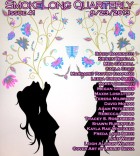Thank you for your beautiful and evocative story, “Rain Delay.” What sparked it? Was there a particular inspiration behind it?
Thanks, Claudia. “Rain Delay” started with an image I had been carrying around for a few years, after my father (who enjoys hyperbole) recalled how my mother liked pickles so much that she would “swallow them whole.” The rest of the story came together for a “Magic Moment” exercise in my Techniques of Fiction class. Structurally, I wrote backwards, trying to pin the lasting image—the “Magic Moment”—first. It was a fun piece to write. I especially enjoy reading it out loud.
“Rain Delay” reminds me of a book I haven’t read in years, Gunter Grass’s The Tin Drum. In it, the main character Oskar’s mother is arguably the closest person to him. After an incident watching an eel fisherman at the coast, she begins to eat fish obsessively and eventually dies. This is the part of the book I remember most vividly. You can almost taste the fish. I think “Rain Delay” has a bit more mystery, but the pickles, what they mean, brought that book to my mind. Have you read it?
Yes, I have. The Tin Drum is a fantastic book. It’s also an incredible film. I like a bit of mystery. I think it provides longevity. I’ve always been fascinated with obsessions and the preservation of memory and moments—how two people can remember the same event differently or how two people can associate the same image differently. As a writer, I try to use this to my advantage. If something’s at risk of being sentimental—as is often the case with reflective, memory-based pieces—you can use images (like a fish or a drum) to trigger emotions. If done carefully (as in planted appropriately—not simply used in haste), these can hit different readers in different ways. This is part of what makes fiction so powerful, what makes writing so fun. For me, pickles made sense on multiple levels. Most important is that pickling something is to preserve it (but not forever). This, in turn, serves memory. But it also prolongs the inevitable.
I am so taken with the title of this story. It captures the gray sky, the feeling of suspension before rain, and adds to the moody, reflective nature of the piece. Could you talk a little about titles? What makes a good one, in your opinion?
For me, a good title reveals something that isn’t revealed by the story itself—it’s illuminating. From experience, I find that the titles I make a conscious effort to think of are often the weakest. They end up defining the story more than the story defines the title. Those that come to me, like “Rain Delay,” tend to be stronger. I think it’s important not to push a title out. Unfortunately, there isn’t a formula. On another note, when I first started reading for Fugue, I took note of how titles drew me to a piece. This is something that I also tend to keep in mind. No one ever HAS to read your writing. You need to make then WANT to read it. A good title is a good place to start.
Who are some of your favorite writers working in flash fiction today? (Or, you could change this to who are some of your favorite writers…)
Much of the flash fiction I read are in journals like SmokeLong. My favorite single author collection of flashes is John Edgar Wideman’s Briefs. I think writing teachers could afford to emphasize flash fiction some more. It’s an especially good format for beginning/intermediate writers. Actually, I came very close to assigning an anthology of flash fiction for my Beginning Fiction Writing class this fall. It didn’t make it to the syllabus this time, but I do hope to teach similar anthologies in the future.



 The core workshop of SmokeLong Fitness is all in writing, so you can take part from anywhere at anytime. We are excited about creating a supportive, consistent and structured environment for flash writers to work on their craft in a community. We are thrilled and proud to say that our workshop participants have won, placed, or been listed in every major flash competition. Community works.
The core workshop of SmokeLong Fitness is all in writing, so you can take part from anywhere at anytime. We are excited about creating a supportive, consistent and structured environment for flash writers to work on their craft in a community. We are thrilled and proud to say that our workshop participants have won, placed, or been listed in every major flash competition. Community works.